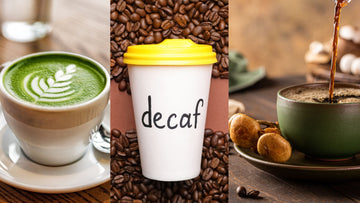
If you’ve ever had to give up coffee, you know the struggle is real.
Whether it’s due to anxiety, gut issues, hormone imbalances, thyroid problems, or a recommendation from your health practitioner, the idea of letting go of your beloved morning brew can feel like losing a part of your identity.
That’s exactly where Not Coffee began.
As more people begin to question their relationship with caffeine, the market has flooded with alternatives: decaf coffee, matcha lattes, mushroom elixirs, and adaptogenic blends. But for many people, those options don’t quite fill the void that coffee leaves behind.
So why did we feel the need to create something else?
Let’s break it down.
The Problem With Decaf: It’s Not Truly Caffeine-Free
Many people assume decaf is a safe bet when trying to eliminate caffeine. But the truth is, decaf coffee still contains caffeine—just less of it.
In fact, one study found that a single cup of decaf can contain anywhere from 2 to 15 milligrams of caffeine [1]. And unlike supplements, caffeine content in decaf isn’t strictly regulated, which means you don’t actually know how much you’re consuming.
For people dealing with adrenal fatigue, heart conditions, or stimulant sensitivity, even a small amount of caffeine can be too much.
Not Coffee is 100% caffeine-free and stimulant-free. There are no hidden traces, no grey areas. It’s a beverage you can trust, no matter your condition.
Matcha, Green Tea & Chai: Still Sources of Stimulation
Yes, matcha is rich in antioxidants. And chai has beautiful warming spices. But they also contain caffeine—and in the case of matcha, quite a bit.
Matcha has about 70mg of caffeine per cup. While it may be marketed as "gentler" than coffee due to the presence of L-theanine (which can help with calm focus), the bottom line is: it’s still a stimulant.
For those working on hormonal balance, fertility, nervous system regulation or autoimmune healing, stimulants are often discouraged. It doesn’t matter where the caffeine comes from—your body still has to process it.
Not Coffee was created specifically for those who can’t tolerate any caffeine at all. It’s your go-to when your body is asking for rest, nourishment, and support.
Mushroom Coffees: Functional, But Not a Coffee Replacement
Mushroom coffees are gaining popularity for their adaptogenic benefits. They contain ingredients like lion’s mane, chaga, and reishi—which are great for the immune system and cognitive health.
But most mushroom coffee blends still contain coffee or added caffeine. And those that don’t? They often don’t taste or feel like coffee.
If you love the rich, roasted taste and comforting ritual of coffee, mushroom elixirs can feel like a far cry from your usual cup.
Not Coffee was designed to replicate your coffee ritual. It brews like coffee. It smells like coffee. It tastes roasted and rich—not like herbs or mushrooms.
And it comes in two versions:
-
Ground: Works in espresso machines, stovetops, plungers.
-
Instant: Just add hot water or milk and stir.
Because the ritual matters just as much as the ingredients.
Why Not Coffee Is Different
We didn’t just want to make a healthy drink.
We wanted to make a healthy drink that gave people back their morning moment.
Here’s what sets Not Coffee apart:
-
100% Caffeine-Free: No stimulants. Not even a trace.
-
Gut-Friendly: Free from acidity, additives, and common gut irritants.
-
Hormone-Safe: Designed with the most sensitive systems in mind.
-
Delicious: Roasted chicory, organic carob, and chickpea give it a smooth, satisfying flavour.
-
Versatile: Available in ground and instant formats. Four flavours: Original, Vanilla, Hazelnut, and Caramel.
-
Nourishing: Gentle enough for kids, pregnancy, and even those going through chemo.
Thousands of people have told us that Not Coffee changed their lives. Because when you have to give up so many things for your health, being able to hold onto your coffee ritual means everything.
Why We Created It
Not Coffee was born after I (Sila) was diagnosed with Graves’ Disease, an autoimmune thyroid condition. My Chinese Medicine doctor told me I had to give up caffeine completely—not just coffee, but decaf, matcha, black tea, chai, everything.
I felt like I lost a part of myself.
I could give up everything else, but not my coffee. That’s when I turned to my husband and said, "I wish there was something that looked like coffee, acted like coffee, tasted like coffee... but was actually good for me."
So we made it.
Then we discovered we weren’t the only ones who needed it.
The Bottom Line
Decaf, matcha, and mushroom coffee have their place. But if you’re looking to truly eliminate caffeine—and still enjoy the rich, grounding experience of coffee—Not Coffee was made for you.
We’re not anti-coffee. We’re just pro-choice.
And for those who have had to give up coffee for their health, healing, or hormones, we want to be the first name they think of.
Not Coffee is more than a beverage. It’s a ritual. A moment. A reminder that health doesn’t have to mean missing out.
References
[1] Mayo Clinic. (2023). How much caffeine is in decaf coffee? Retrieved from https://www.mayoclinic.org





